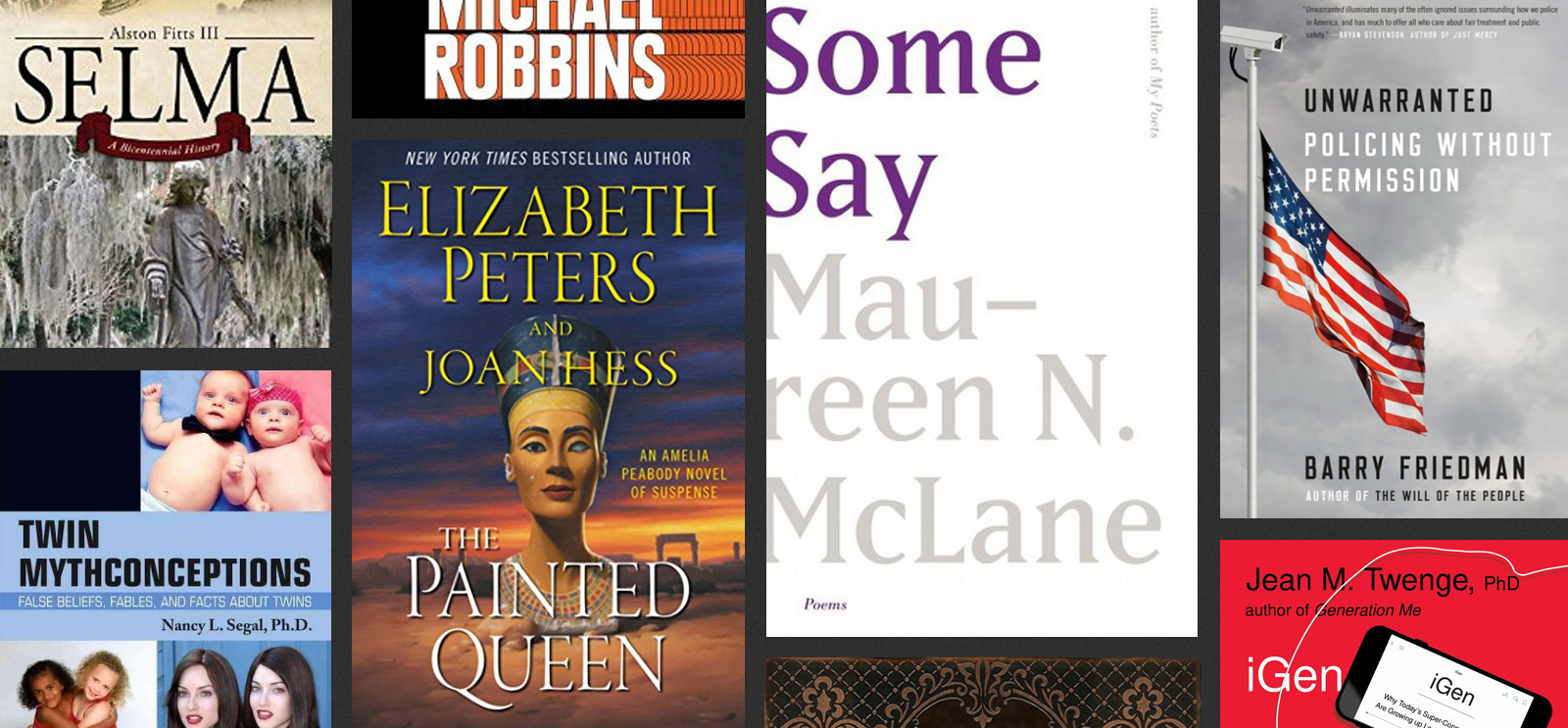
(Collage by Joy Olivia Miller)
The Magazine lists a selection of general interest books, films, and albums by alumni. For additional alumni releases, browse the Magazine’s Goodreads bookshelf
The Painted Queen
Elizabeth Peters (neé Barbara Mertz), PhB’47, AM’50, PhD’52
In the 20th and final installment of Elizabeth Peters’s Amelia Peabody mystery series (published posthumously), Amelia, an Egyptologist, arrives in Cairo for an excavation in 1912. She is soon confronted with a would-be assassin, the murder of multiple monocled men, and the disappearance of a precious artifact. Digging into the mysteries leads her to her shadowy archnemesis, whose identity Amelia can finally unearth.
Unwarranted: Policing Without Permission
Barry Friedman, AB’78
From local sheriffs to the National Security Agency, policing in the United States is too often conducted using undisclosed guidelines and with little, if any, oversight or accountability, argues New York University law professor Barry Friedman. Focusing on how facial recognition software, metadata collection, and other technological advances have significantly expanded what police forces are able to do, with or without a warrant, Friedman lays out what he sees as necessary reforms to ensure Americans’ Fourth Amendment rights remain intact.
Twin Mythconceptions: False Beliefs, Fables, and Facts about Twins
Nancy L. Segal, AM’74, PhD’82
Twins don’t always share an intimate emotional connection, most surviving conjoined twins are female, and the fraternal twins of multiracial couples can have very different skin tones. In her latest book on twins, behavioral scientist Nancy L. Segal examines more than 70 commonly held beliefs about twins, debunking myths and sharing recent findings.
Some Say
Maureen McLane, PhD’97
In her fifth collection of poetry, Maureen McLane turns to the landscape around her to make sense of the present moment. Out in the woods or deep in a city, from the farthest reaches of the universe to her innermost self, McLane’s poems occupy space dark and temporal, “in the weather of an old day / suckerpunched by a spiral / of Arctic air.”
Selma: A Bicentennial History
Alston Fitts III, PhD’74
In 1965 images of state troopers beating civil rights marchers in Selma, AL, shocked Americans across the country and helped spur the passage of the Voting Rights Act later that year. They also thrust the small Southern city into the national spotlight. In his chronicle of Selma’s two centuries of history, native Alabamian Alston Fitts III explores the city’s growth and influence, with a particular focus on how race relations affected the development of the city, and of the United States.
iGen: Why Today’s Super-Connected Kids Are Growing Up Less Rebellious, More Tolerant, Less Happy—and Completely Unprepared for Adulthood—and What That Means for the Rest of Us
Jean M. Twenge, AB’93, AM’93
Move over, millennials. Members of what psychologist Jean M. Twenge calls iGen—those born after 1995—have already begun to shape American culture, and they differ from their predecessors in significant ways. They’re more tolerant, more anxious, less religious, and having less sex—key insights for those who are parenting, educating, or employing the next generation.
Equipment for Living: On Poetry and Pop Music
Michael Robbins, AM’04, PhD’11
What is the use of art? Poet Michael Robbins offers an analysis of how pop music and poetry help us live life—from the heavy metal that makes teenagers feel understood to the transgressive poems of Frederick Seidel that give expression to unspeakable tragedy to the late-night a capella renditions of Miley Cyrus songs outside bars that bond strangers on a sidewalk. With essays on artists including W. B. Yeats and Taylor Swift, this collection argues for the utility of all poetry, written or sung—even Journey’s “Separate Ways.”
